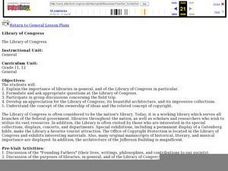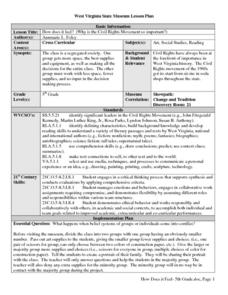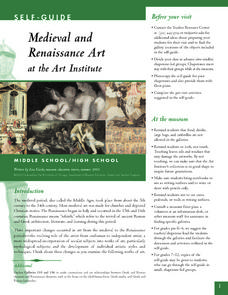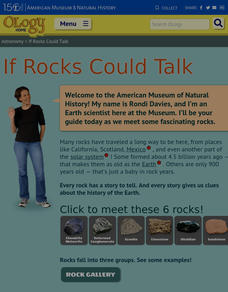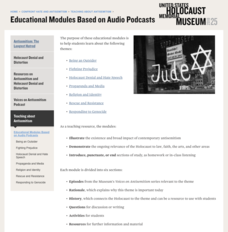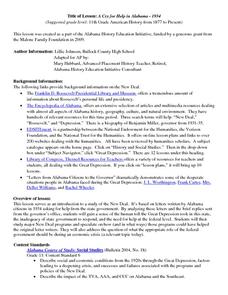Curated OER
Dry-Land Kalo-Growing New Plants from Stems
Students explore Hawaiian plants. In this Hawaii culture and botany instructional activity, students plant the haha(stem) of a taro plant. Students listen to Hawaiian myths about the taro plant and chorally speak a Hawaiian chant of...
Curated OER
It's Aviation Awareness Week!
There are easy ways to incorporate activities related to Aviation History Month in your classroom.
Curated OER
The Arthropod Story
Students learn a number of evolutionary concepts by following the long history of the arthropods and have opportunities to think about arthropod evolution in terms of both opportunities and constraints.
Curated OER
Combating Corrosion
Students perform an experiment to show the chemical reactions that occur when metal corrodes. They apply the results of the experiment to the conservation efforts of art curators trying to restore an ancient Greek bronze. This lesson...
Curated OER
Airplanes and Airports: How To Take Off Without Ever Leaving the Ground
Students plan an airport visit. In this Airplanes and Airports instructional activity, students observe the people, activity, and machinery at airports. Then students compare the characteristics of their observations at the airport....
Curated OER
Understanding Tenement Life
Learners look at life for immigrants in the 19th century. In this immigrant lesson, students discuss how the poor German, Irish, Italian, and Jewish immigrants lived in tenement housing. They research the reasons they came to America...
Curated OER
Women In Aviation
In this aviation instructional activity, students take an electronic field trip to the Aviation Museum of Kentucjy. In the process the instructional activity looks at women in aviation history. The focus is upon how they could be...
Curated OER
Heartfelt/Handmade Activities: Genre Painting
Students examine genre painting. They explore the Illinois State Museum website, identify how genre paintings were composed, analyze the activities of an Illinois farm in the 1850s, and create a genre painting of current everyday...
Curated OER
Library of Congress
Learners visit the Library of Congress to help them explain the importance of this library and the concept of ownership of ides.
Curated OER
How does it feel? Why is the Civil Rights Movement so Important?
Fifth graders study the Civil War. In this US history lesson, 5th graders simulate what life was like during the Civil War by having two groups with one group given more materials than the other group. Students then draw a portrait of...
Curated OER
Elements of Culture
Sixth graders work in small groups to research an ancient culture using guide questions. They use note-taking and research skills, and organize their research information using a software graphic organizer program. They create a museum...
Curated OER
At Home on the French Frontier: 1700-1800
Students role play bartering for goods and services as the French settlers did in colonial Illinois. They start with eight household items to acquire through bartering. They have to calculate values for each object and determine the...
Curated OER
Medieval and Renaissance Art at the Art Institute
Students examine several Medieval and Renaissance works of art, including painting and sculpture, at the Art Institute of Chicago. They use worksheets and discussion questions to enhance their interpretation of the pieces.
Curated OER
The Homefront: America and WWII
Students are introduced to the experiences of various groups of Americans at home during WWII, highlighting race, gender, and ethnicity. They improve their ability to analyze and interpret historical documents and images.
University of Minnesota
Beautiful Brain: Do You See What I See?
Can art play tricks on your eyes, and can a still painting really appear to vibrate? The second instructional activity in a four-part series discusses the way our beautiful brains translate visual images. It highlights the style of...
University of Minnesota
Beautiful Brain: Step Inside the Brain
Before digital microscopes, scientists hired artists to draw the things visible in the microscope. Through training in neuroscience and art, Cajal revolutionized the way we view the beautiful brain. The third lesson in a series of four...
Museum of Disability
Looking Out for Sarah
Perry the dog is Sarah's best friend and her guide to the visual world. Young readers learn about guide dogs and communication with Looking Out for Sarah by Glenna Lang, through a series of discussion questions and activities.
American Museum of Natural History
Being a Conservation Biologist: Eleanor Sterling
Eleanor Sterling responds to 21 questions posed by young learners about the challenges she faces as a woman conservation biologist. She also discusses her research of the aye-aye, an unusual animal that lives in Madagascar.
American Museum of Natural History
If Rocks Could Talk
Meet some interesting rocks. Learners discover information about the three types of rocks and different rocks that are within each group. They read imaginary interviews with six rocks as each rock tells the story of their formation and a...
US Holocaust Museum
Educational Modules Based on Audio Podcasts
Imagine hearing someone claim an event like the Holocaust never happened. Pupils use audio podcasts and reading passages to dive into the lives of those impacted by the Holocaust of World War II. Using the information they gather, class...
American Museum of Natural History
Journey to Deep Sea Vents
Take a deep dive into oceanography. The online interactive allows for learners to board a submersible to dive to the bottom of the ocean to investigate sea vents. On the way down, individuals see different marine life at different...
Alabama Department of Archives and History
A Cry for Help in Alabama - 1934
What should be the role of the federal government during an economic crisis? That is the question at the center of this introduction to a study of the New Deal. Class members examine letters to the state government asking for help,...
American Museum of Natural History
Being a Zoologist: Sandra Olsen
Are your students wild about horses? Then introduce them Sandra Olsen, a zooarchaeologist, who has been studying horses and the people who herd them. Ms Olsen responds to 15 interview questions and details how she goes about her...
Museum of Disability
A Picture Book of Helen Keller
Teach your class about Helen Keller and her accomplishments with a reading comprehension lesson based on A Picture Book of Helen Keller by David A. Adler. As individuals read, they answer discussion questions about Helen Keller and the...










